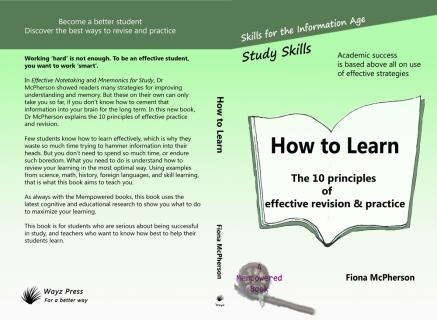Note that this book has been updated! The new edition is available as How to revise and practice
Working ‘hard’ is not enough. To be an effective student, you want to work ‘smart’.
Being a successful student is far more about being a smart user of effective strategies than about being 'smart'. In Effective Notetaking and Mnemonics for Study, Dr McPherson showed readers many strategies for improving understanding and memory. But these on their own can only take you so far, if you don’t know how to cement that information into your brain for the long term. In this new book, Dr McPherson explains the 10 principles of effective practice and revision.
Few students know how to learn effectively, which is why they waste so much time going over and over material, as they try to hammer it into their heads. But you don’t need to spend all that time, and you don’t need to endure such boredom. What you need to do is understand how to review your learning in the most optimal way. Using examples from science, math, history, foreign languages, and skill learning, that is what this book aims to teach you.
As always with the Mempowered books, this book doesn't re-hash the same tired advice that's been peddled for so long, but uses the latest cognitive and educational research to show you what to do to maximize your learning.
This book is for students who are serious about being successful in study, and teachers who want to know how best to help their students learn.
Publication date: November, 2013
Number of pages: 296
ISBN: 9781927166147
1. What you need to know about memory
The 8 basic principles of memory
How neurons work
Working memory — a constraining factor
The role of consolidation in memory
Points to remember
2. What should you practice?
Some examples
Points to remember
3. Retrieval practice
Comparison of retrieval practice with other strategies
Re-reading
Keyword mnemonic
Concept maps
Benefits for related information
Errorless learning
Forced guessing
Points to remember
4. How often should you practice?
Criterion levels set the number of correct retrievals
Task difficulty affects optimal criterion level
Individual items may demand different criterion levels
Individual differences matter
How many times should you review?
Session spacing may be a factor
Recommended schedule
Points to remember
5. Spacing your practice
The advantage of spreading out your practice
Optimal spacing
The need for review
Stretching the review interval
Distributing your reviews
How type of material & task may affect spacing's benefits
Points to remember
6. Spacing within your study session
The importance of interleaving for category and type learning
Why should interleaved practice be more effective than massed practice?
Why people persist in believing massed practice is better
Preventing interference
Consolidation during rest
Children's brains may work differently
Aging also affects consolidation & interference
Spacing & interleaving for complex material
Points to remember
7. Putting it all together
Why is spaced retrieval practice so effective?
The ten principles of effective practice
8. Specific strategies
Flashcards
When to drop a card from the stack
How many cards in a stack
Best practice for flashcards
Flashcard variant
Keyword mnemonic
Using mnemonics for complex information
Using a mnemonic effectively
Questioning
How to display your questions
Points to remember
Concept maps
Points to remember
9. Skill learning
Skill learning begins with instruction
Modeling
Automating action sequences is the heart of motor skill learning
How ‘muscle memory’ is different from information memory
Deliberate practice
Breaking down a skill
Varied repetition
Feedback
Self-monitoring and goal-setting
Metacognition and self-monitoring
Not all practice is, or should be, deliberate practice
Mental practice
Cognitive skills
Worked examples provide models for cognitive skills
Automatization is the core attribute of all skills
Approach skill learning like an expert
The 10 principles of effective skill practice
Points to remember
10. Putting all this into practice
Beliefs that stand in the way of effective learning
Test anxiety
Habits can break or make you
Scheduling your reviews
Bottom line
Glossary
References

